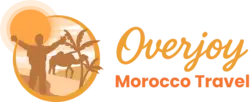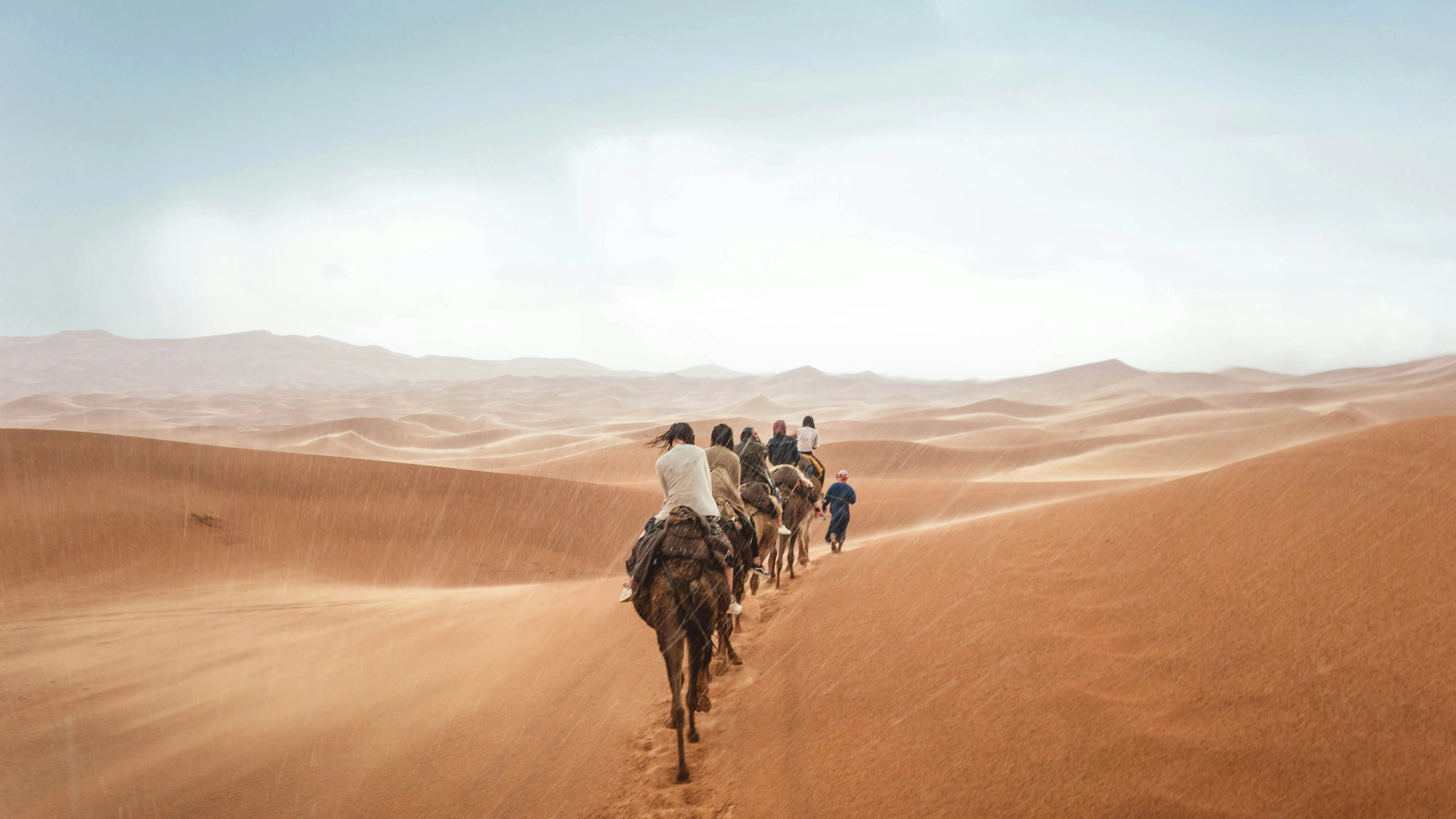Morocco Desert Tour FAQ
Complete Guide to Sahara Adventures from Marrakech to Fes
Planning a desert tour from Marrakech to Fes? You're about to embark on one of the most magical experiences Morocco has to offer. This comprehensive FAQ answers essential questions about Sahara desert adventures—from practical tips to cultural insights that will enrich your journey.
🗺️ Planning Your Desert Tour
How many days do I need for a Marrakech to Fes desert tour?
The ideal duration is 3–4 days for a complete experience:
3-Day Tours
- Perfect for first-time visitors with limited time
- Covers major highlights: Ait Benhaddou, Dades Valley, Merzouga
- One night in a Sahara desert camp
- Balanced mix of travel and exploration
4-Day Tours
- More relaxed pace with deeper cultural immersion
- Extra night for more activities and photo opportunities
- Ideal for families and slower travelers
2-Day Tours
- Fast-paced and rushed
- Limited time at key stops
- Only recommended if you're on a very tight schedule
What’s the best time of year for a Morocco desert tour?
Spring (March–May)
- Comfortable temps (20–28°C)
- Cool evenings ideal for camping
- Wildflowers and green valleys
- Great visibility for photos
Fall (October–November)
- Similar temps to spring
- Clear skies, minimal rain
- Ideal for camel trekking
Winter (December–February)
- Mild days (15–22°C), cold nights (down to 0°C)
- Fewer tourists, lower prices
- Requires warm clothing
Summer (June–August)
- Extremely hot (40°C+ daytime)
- Best for experienced travelers
- Less crowded
- Early morning/evening activities only
How much does a Morocco desert tour cost?
Budget (€150–250 for 3 days)
- Basic accommodations
- Shared transport
- Standard desert camp
- Simple meals included
Mid-Range (€300–500 for 3 days)
- Comfortable riads/hotels
- Private or small group transport
- Quality desert camp with private tents
- Traditional meals and some extras
Luxury (€600–1200+ for 3 days)
- Boutique riads and top-tier hotels
- Private transport with expert guides
- Luxury camps with en-suite bathrooms
- Gourmet meals and VIP services
Prices vary by season, group size, and inclusions.
🐪 Camel Trekking Questions
Is camel riding safe for beginners?
Yes, it's safe with trained guides. Here’s what to expect:
Safety:
- Well-trained camels
- Guided by professionals
- Briefing before ride
- Easy mounting/dismounting
Experience:
- Gentle swaying motion
- 1–1.5 hour ride to the camp
- No experience required
Physical Considerations:
- Not ideal for pregnant women
- Can be hard on people with back issues
- Kids (6+) can ride with supervision
- 4x4 alternative available
What should I bring for camel trekking?
Must-Haves:
- Comfortable long pants (avoid chafing)
- Closed-toe shoes
- Hat and sunglasses
- Headscarf or turban
- Sunscreen
- Small backpack
Avoid:
- Shorts
- Flip-flops or sandals
- Loose jewelry
- White clothes (show dirt easily)
Can children go on camel treks?
Yes! With these considerations:
- 6+ years: Ride solo with supervision
- Under 6: Ride with adult
- 10+ years: Usually comfortable riding alone
Tips for families:
- Opt for shorter treks
- Look for child-friendly camps
- Plan flexible itineraries
⛺ Desert Camp Experience
What are desert camps like in Morocco?
Standard Camps
- Berber-style tents
- Shared bathrooms
- Communal dining
- Clean and basic
Luxury Camps
- Private en-suite tents
- Hot showers, premium bedding
- Gourmet meals
What's Included
- Campfire dinner
- Berber music and entertainment
- Stargazing
- Breakfast before departure
Will I be comfortable sleeping in the desert?
Yes, especially with proper prep.
Bedding:
- Real beds, clean sheets
- Extra blankets for winter
Temperatures:
- Summer: Warm nights, light sleepwear
- Winter: Cold nights, bundle up
- Spring/Fall: Ideal for sleep
Facilities:
- Most have toilets and showers
- Luxury camps = hot water
Can I stargaze in the Sahara?
Absolutely. The Sahara offers incredible night skies.
- What You’ll See:
- Milky Way, shooting stars, planets
- Best Times:
- After dinner (9–11 PM)
- Before sunrise (5–6 AM)
- Tips:
- Use a tripod and long-exposure camera
- Ask guides for constellations
🎒 Weather & Packing Guide
What should I pack?
Essentials (All Seasons):
- Long pants (2–3 pairs)
- Long-sleeved shirts
- Walking shoes
- Hat and scarf
- Sunglasses
Summer:
- Light fabrics
- Extra sunscreen
- Breathable long sleeves
Winter:
- Thermal layers
- Warm sleepwear
- Jacket, gloves, hat
Spring/Fall:
- Light jacket
- Mix of warm and cool options
Personal Items:
- Toiletries
- Camera + batteries
- Power bank
- Water bottle
- Wet wipes
How hot or cold does it get in the Sahara?
Summer:
- Day: 40–45°C
- Night: 25–30°C
Winter:
- Day: 18–22°C
- Night: 0–5°C
Spring/Fall:
- Day: 25–30°C
- Night: 10–15°C
Desert temps can swing dramatically between day and night.
🕌 Culture & Safety
Is Morocco safe for tourists?
Yes, generally very safe.
Government Measures:
- Tourism police
- Safety-focused infrastructure
Travel Tips:
- Book with trusted operators
- Keep valuables secure
- Respect local customs
Desert Safety:
- Guided by experts
- First aid ready
- Emergency comms available
What cultural etiquette should I follow?
Dress Code:
- Cover shoulders/knees
- Modest, loose clothing
- Remove shoes indoors
- Headscarf for mosque visits
Social Etiquette:
- Use right hand for greetings
- Accept tea (it's sacred)
- Ask before taking photos
- Respect prayer times
Tipping Guidelines:
- Camel handlers: 20–50 MAD/day
- Driver/Guide: 100–150 MAD/day
- Camp staff: 20–30 MAD
- Restaurants: 10–15%
Do I need vaccinations?
No mandatory vaccines, but the following are recommended:
- Hepatitis A/B
- Typhoid (if visiting rural areas)
- Routine vaccines up to date
Health Tips:
- Only drink bottled water
- Avoid tap water and ice
- Eat at trusted restaurants
🍴 Food & Dining
What will I eat?
Breakfast:
- Moroccan bread, jam, honey
- Tea/coffee, fruit, eggs/pancakes
Lunch:
- Tagine, couscous
- Salads, local dishes
Dinner (Camp):
- Fire-cooked tagine
- Grilled meats, veggies
- Bread and fruit
Dietary Needs:
- Vegetarian: widely available
- Vegan: ask ahead
- Gluten-free: limited options
- All food is halal
Is the water safe to drink?
Use Bottled Water:
- For drinking & brushing teeth
- Usually provided at camps
Avoid:
- Tap water
- Ice in drinks
- Street drinks in rural areas
🚗 Transportation & Connectivity
What type of vehicle is used?
4x4 SUVs (Standard):
- A/C, off-road ready
- Seats 6–8
- Emergency supplies
Private Tours:
- More flexibility
- Professional guide
- Personalized stops
Group Tours:
- Vans/minibuses
- Budget-friendly
- Social atmosphere
Will I have Wi-Fi or cell service?
In Cities:
- Strong signal
- Wi-Fi in hotels and cafes
In Desert:
- No service in basic camps
- Some luxury camps offer satellite Wi-Fi
- Offline maps & portable chargers recommended
Can I charge my devices?
Hotels/Riads:
- Standard plugs
- 220V, Type C/E (European)
Desert Camps:
- Basic: limited solar power
- Luxury: outlets in tents
- Shared stations common
- Bring a power bank
⚠️ Special Considerations
Can pregnant women go?
Not recommended due to:
- Camel riding motion
- Long road journeys
- Remote medical access
If pregnant, consult a doctor, choose 4x4 transport, and stay in luxury accommodations.
What about mobility issues?
- 4x4 alternative to camels
- Reduced walking itineraries
- Accessible riads (some)
- Flexible pacing
Note: terrain is uneven and not all places are accessible.
Is travel insurance necessary?
Highly recommended!
Should cover:
- Medical emergencies
- Cancellations/delays
- Theft/loss
- Camel trekking and adventure activities
📸 Photography Tips
Best shots to capture:
- Camel caravans at sunset
- Dunes of Erg Chebbi
- Night sky & star trails
- Berber camp scenes
- Atlas Mountains
Tips:
- Shoot during golden hour
- Bring extra batteries
- Use tripod at night
- Wide-angle lens for landscapes
Can I photograph locals?
Yes, but with respect.
- Ask permission first
- Respect if they decline
- A small tip is appreciated
- Avoid taking pictures of women/children without permission
- Some religious sites forbid photos
🏁 Conclusion
A Marrakech to Fes desert tour is one of Morocco’s most transformative journeys. From the Atlas Mountains to the Sahara dunes, from ancient kasbahs to Berber hospitality—it’s a trip that leaves a lasting impact.
With proper preparation and cultural awareness, your adventure will be unforgettable. Whether you're dreaming of camel rides, stargazing in the desert, or exploring Morocco’s rich culture, this guide ensures you're ready for the ride.
Start planning your Morocco desert adventure today!




